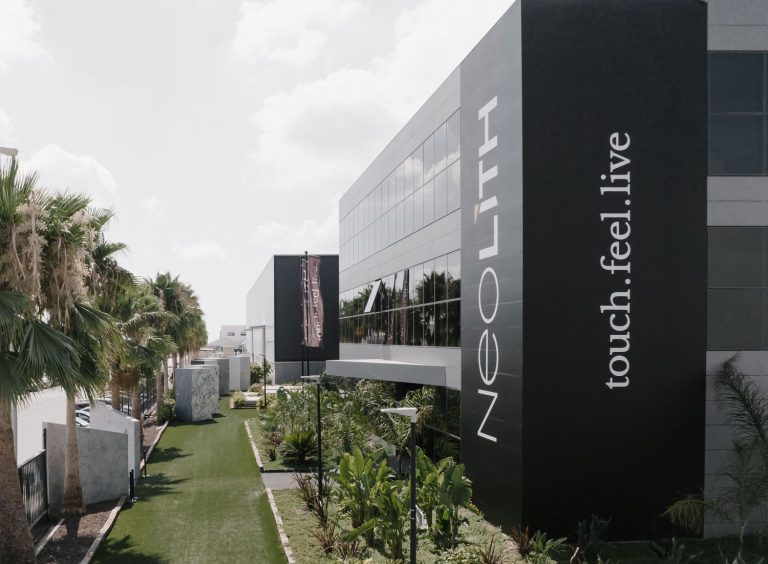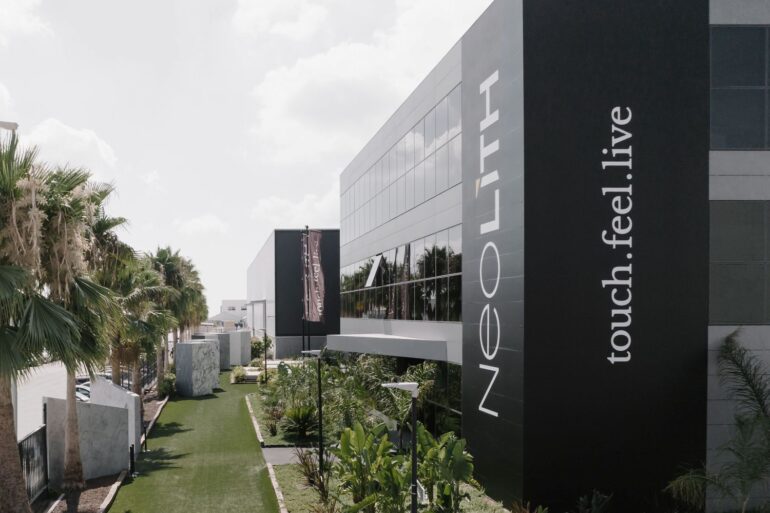
Share
Leader in sintered stone Neolith has announced its science-based targets have been approved by the Science Based Targets Initiative (SBTi) for 2024 after the company adhered to the commitment a couple of years ago. This confirms Neolith is tackling global warming and is actively taking action towards decarbonisation as the main priority within its sustainability agenda.
Aware of the importance of preserving our natural resources, Neolith uses all-natural raw materials to manufacture its sintered stone architectural surfaces. The company also recognises the direct impact its business has on the environment. Given the urgency of eradicating global warming and avoiding the “code red for humanity,” as described by the UN, which warns against exceeding a global temperature rise of 1.5ºC, it is critical to cut emissions in half by 2030 and achieve net zero by 2050. Direct emission reductions will be prioritised, and any residual emissions will be neutralised by SBTi criteria to reach net-zero emissions.
Neolith has also taken relevant steps in both endorsing the SBTi and earning prestigious certifications that reinforce the company’s efforts towards achieving its full decarbonisation goal.
Jesús Ayarza, CEO of Neolith Group, comments “we are honoured to have our science-based emission reduction targets approved by the SBTi. This truly demonstrates our absolute commitment to fully decarbonise our company by 2050 and positions us on the correct path to achieve it. From its inception, Neolith’s sustainability agenda has always been a priority, and we will continue to work towards achieving this goal.”
The Science Based Targets initiative (SBTi) is a corporate climate action organisation that enables companies and financial institutions worldwide to play their part in combatting the climate crisis. The organisation develops standards and guidance that help companies set greenhouse gas emissions reduction targets aligned with limiting global warming to 1.5ºC and transitioning to a net-zero economy.
The SBTi provides target validation services in line with SBTi standards, supporting organisations towards their decarbonisation journey.
Neolith’s approved targets can be consulted on the Science Based Targets initiative website. Neolith Group has committed to reaching net-zero greenhouse gas emissions across the value chain by 2050. Neolith commits to reduce absolute scope 1 and 2 GHG emissions by 50.4% by 2032 from a 2022 base year for the near-term targets and reduce absolute scope 3 GHG emissions by 30% within the same timeframe. Near-term targets outline the amount by which organisations will reduce their emissions over the next 5-10 years. They are also a requirement for companies wishing to set net-zero targets. As per the long-term targets, which indicate the degree of emission reductions organisations need to achieve net zero according to the SBTi’s Corporate Net-Zero Standard criteria, the company commits to reduce absolute scope 1, 2 and 3 emissions by 90% by 2050 from 2022 base year.
The validation of these targets reaffirms Neolith’s strong commitment towards full decarbonisation, as its main goal set up on its sustainability agenda. Since its inception, Neolith has remained a global benchmark in the design and innovation of sintered stone surfaces. This reinforces the company’s dedication to integrating sustainable solutions with exceptional designs that inspire and transform spaces while minimising environmental impact.
In addition to Neolith’s near-term and net-zero science-based targets being validated by the SBTi during this year, Neolith has also obtained the Cradle to Cradle Certified® Bronze certification for most of its products. Within 2024, the company has also improved its positioning of the EcoVadis Gold seal, increasing its percentile from 97 to 98, and has renewed its Zero Waste certification as excellent. During this period, Neolith has reaffirmed its continuity with the United Nations Global Compact by supporting its 10 principles for sustainable development to fully incorporate sustainability into its operations, thus contributing to creating safer and more sustainable products for the future.
You can follow the latest news from Neolith at www.neolith.com





